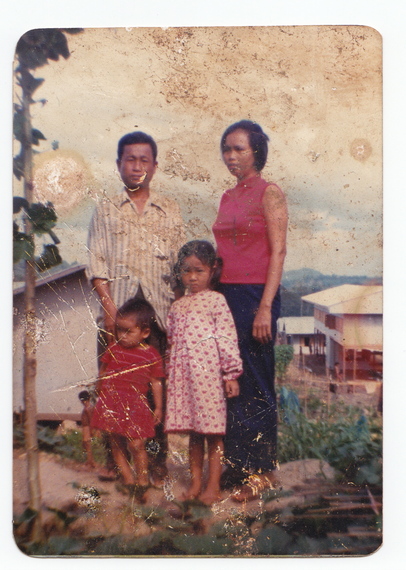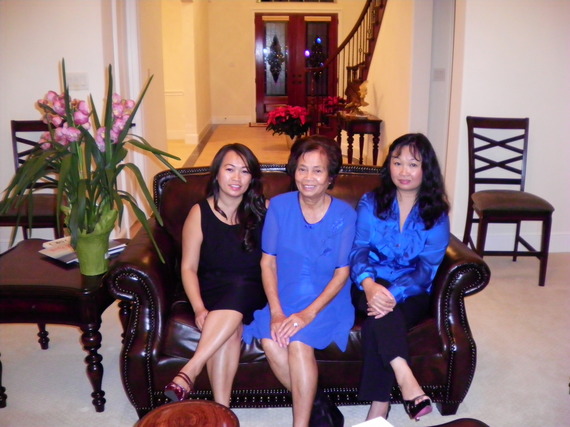I was born on the dirt floor of a rickety straw shack, on the edge of a slave labor camp in Talien, Cambodia. My mother says that I came out covered in grime, red-faced with rage and howling from hunger. When I was born the moment wasn't jubilant, there was no ripe expectancy, no gleeful merriment. Instead, my mother held me and wept.
When I was born, my father was in a re-education camp, many miles away from Talien. Under the Khmer Rouge, re-education meant brutal beatings and savage slave labor until you were well versed in Pol Pot's doxology.
My mother went through this pregnancy virtually alone, helped only by my frail grandmother. As her belly grew, so did her fear. The Khmer Rouge were vicious. The stories my mom heard about pregnant women were horrific; their fetuses ripped out of their bellies with bayonets. Anyone who could not endure the tortuous labor in the fields was beaten to death or worse. Retelling her story to my sister and me, my mother said, "If you cannot work, you are useless. Like a broken toy, they will axe you down." By some amazing grace of God, my mother was able to keep up with the other laborers despite her fatigue and protuberant belly, and her life was spared. But what kind of life was she bringing this new child into? She looked at my sister, then 4 years old. Instead of a plump-cheeked princess, she was now sallow-skinned, sunken-eyed and waddled with a bloated belly. The malnutrition and lack of protein had caused edema and a build-up of ascitic abdominal fluid. Her 4-year-old daughter looked like a grotesque, haggard, pregnant, tiny old woman.
So when I was born, at the edge of the Killing Fields, my mother wept. It felt cruel to bring another life into this living hell. There was no hope in sight that the nightmare would end.
But, for my mom, giving up was not an option. Any task she was assigned by the Khmer Rouge, she quietly did, knowing that refusing was tantamount to death. In the mornings she walked through the village of Talien, her gaunt frame bent over as she hauled two heavy pails. Lurching under the weight of the unwieldy buckets, the contents slopped over her legs, dripped down to her bare, calloused feet, painting trails of putrid brown excrescence on her thin calves. It was human feces. The combination of the fetid stench and the noxious sight of feces coating her calves made her retch. She'd wiped the bilious vomit off her mouth, then pick the pails back up and keep working. My mother's task was to go from house to house throughout Talien and collect the villagers' excrement, which she carried to the fields to be used for fertilizer. It was a task she had accepted in silence, without a single word of protest. The rest of the time, she worked in the rice fields alongside the other forced slave laborers.
My mother did anything she could to keep her children alive. After working all day, she crept into the jungles to forage for food for her young daughters and elderly mother. One time, she was digging for wild bamboo shoots and stumbled upon a litter of tiger cubs in the jungle. Terrified, she ran for her life to escape the mamma tiger, which she was certain was nearby. But arriving back at the hut empty-handed, she mustered up her courage, then returned to the jungle to pick more wild bamboo shoots. To me, that is truly heroic. But, my mother now laughingly says, 'I wasn't fearless. I was just hungry." To me, this is truly a woman with The Heart of a Tiger.
Years later, we escaped from Cambodia and made our way to America.
Arriving in the United States as a refugee, my mom, a college educated former school teacher, took jobs as a janitor, dishwasher and strawberry picker to support her children. My mom was just so grateful to be alive. She was so proud to have the opportunity to work, to live without fear, and to have freedom. She often tells me how proud she is to be an American, and how astonished she is by the kindness of Americans who welcomed us when we were wretched, ragged and destitute. She says that in America, she found hope.
You would think after having survived so much atrocity during the Cambodian Genocide, my mom might be bitter, scared or scarred. Instead, she is one of the most vibrant, giving and brave people I know, who continually inspires me. During my surgical residency, I'd occasionally get the chance to come home at Christmas. After having lived with so little during the Killing Fields, my mother never really adopted the tradition of giving presents at Christmas. Instead, during my brief visits home, my mother would take my sister and me along with her to visit "Miss Violet," a blind, elderly shut-in African-American woman who lived in an unheated shanty in one of Houston's poorest neighborhoods. My mother had befriended "Miss Violet" and often visited with home cooked meals and warm clothes until "Miss Violet" passed years later. That's just my mother's nature, and just one out of the many, many examples of her compassion. She keeps doing it because she believes that's what it means to be an American. This past Christmas, my sister and I continued my mom's tradition.
Instead of buying a tree and presents, we hosted a benefit for Nomi Network, an organization combatting human trafficking and sexual slavery in Cambodia and India. We raised $3,350 that night. This is just a miniscule drop in the bucket when you consider the magnitude of the problem. Today, 32 million people live in slavery, fueling a $99 billion dollar industry which surpasses revenue from the sale of illegal drugs and arms. And, as celebrities like Kathy Ireland and Jada Pinkett Smith pointed out, human trafficking occurs right here in the United States too.
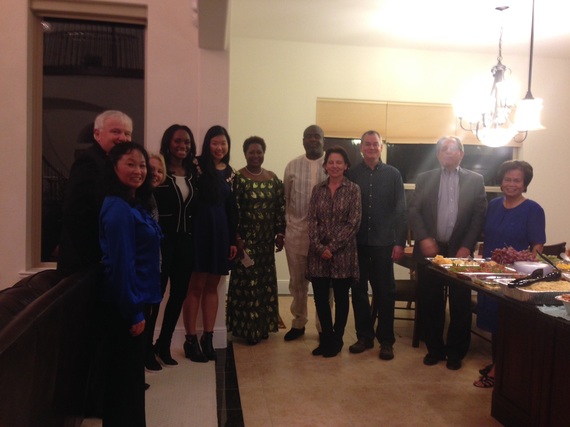
Our friends and colleagues with Diana Mao (center), founder of Nomi Network, speaking about global human trafficking.
However, my mom taught me that it isn't the magnitude of the problem that matters but the willingness of our heart to do something, do anything.
I'm not a politician. I'm not a legal scholar and there's a great deal I don't know about politics, economics and global affairs. What I do know is that my family and I once lived under the tyranny of the Khmer Rouge, part of 7 million people enslaved in forced labor. I am so grateful to this country for opening its doors to my family and me when we had absolutely nothing. We were destitute, didn't speak English, and had absolutely nothing to offer. And yet, we were given the opportunity to come to America -- a country which to me epitomizes courage and compassion. My mom taught me that you can find hope even in the aftermath of genocide; and that the human capacity for compassion can triumph over evil. As we face the challenges of this new year, I hope people will remember that it isn't the magnitude of the problem that matters most, but the courage of our hearts.
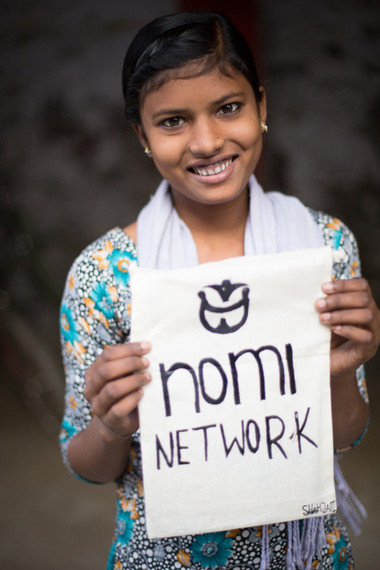
To learn more about Nomi Network and human trafficking, visit http://www.nominetwork.org.
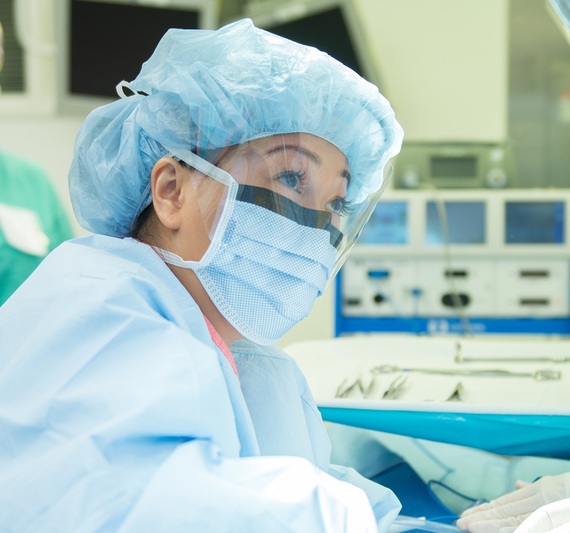
SreyRam Kuy, MD is an Assistant Professor of Surgery at LSU-Shreveport. (photo courtesy of Oregon Stater, Hannah O'Leary)
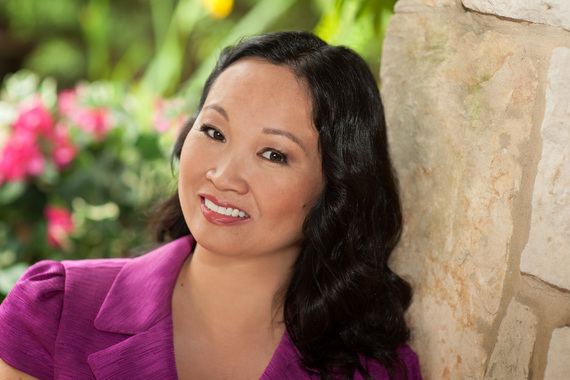
SreyReath Kuy, DPM is a podiatrist in Houston.
They are the authors of the book, The Heart of a Tiger, the inspiring story of a family's survival during the Cambodian Killing Fields, for which they are seeking a publisher. Read more about The Heart of a Tiger at http://www.TheHeartofaTiger.com
